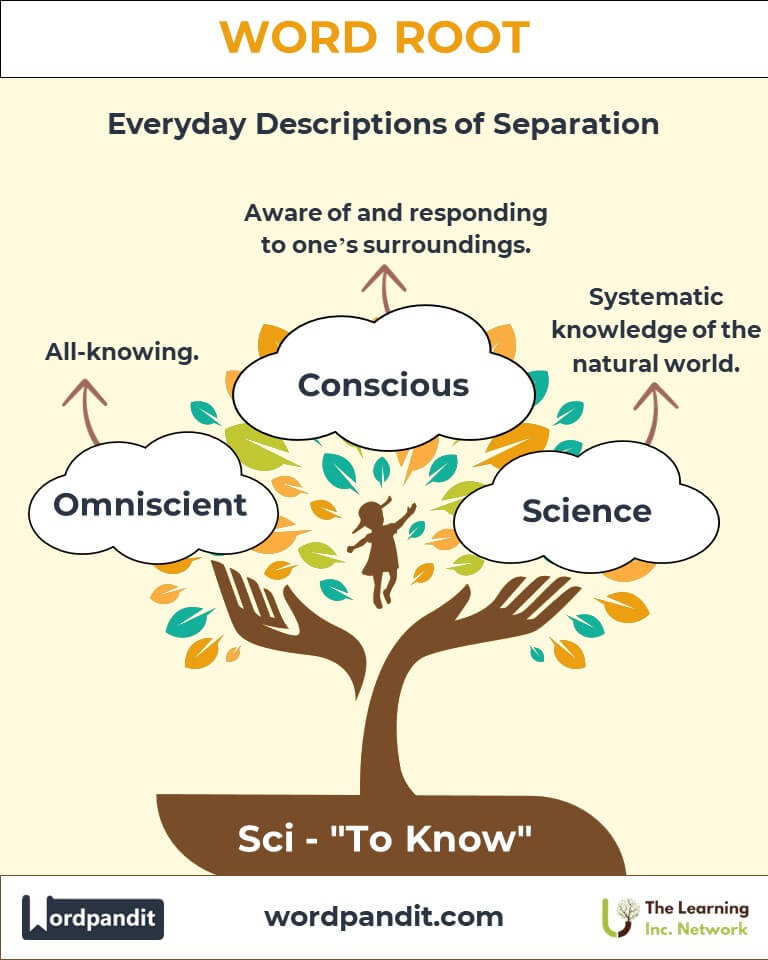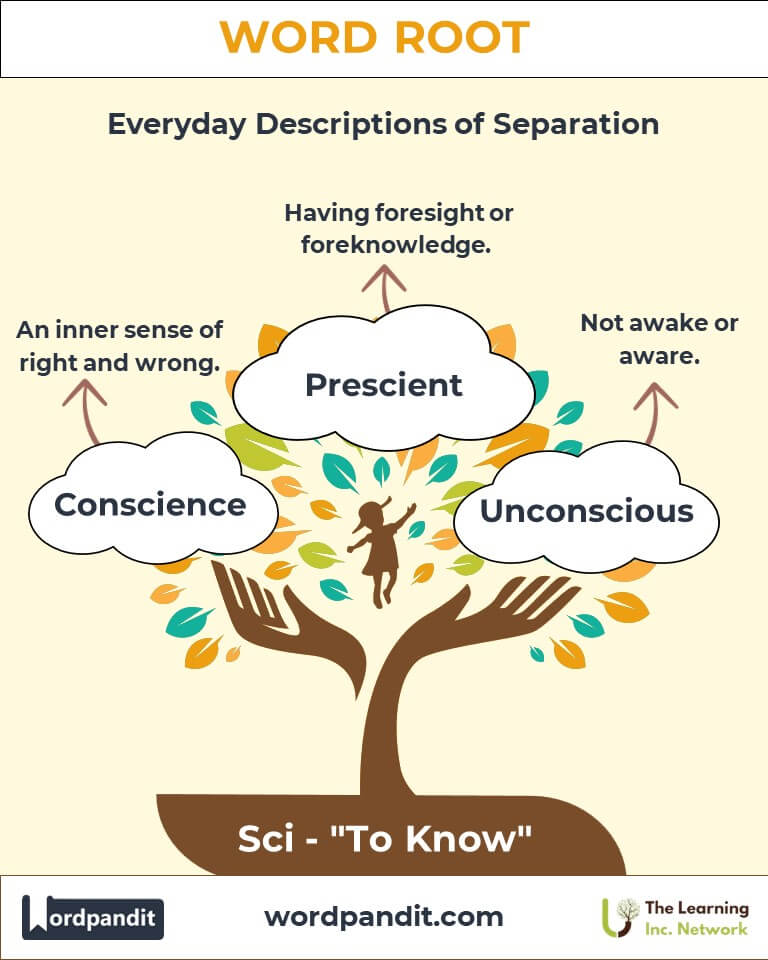Sci: The Root of Knowledge Across Disciplines
Byline: Dive into the fascinating world of the root "Sci," derived from the Latin word scire, meaning "to know." This powerful root forms the foundation of countless words related to knowledge, understanding, and awareness. From the pursuit of science to the whisper of conscience, "sci" encapsulates humanity's quest for insight and moral clarity.

Table of Contents
- Introduction: The Essence of "Sci"
- Etymology and Historical Journey
- Mnemonic: Unlocking the Power of "Sci"
- Common "Sci"-Related Terms
- "Sci" Through Time
- "Sci" in Specialized Fields
- Illustrative Story: "Sci" in Action
- Cultural Significance of the "Sci" Root
- The "Sci" Family Tree
- FAQs About the "Sci" Word Root
- Test Your Knowledge: "Sci" Word Root Quiz
- Conclusion: The Timeless Legacy of "Sci"
1. Introduction: The Essence of "Sci"
What drives the human desire to understand the world? The root "Sci," pronounced as "sigh," holds the answer. Derived from the Latin scire (to know), "Sci" is the cornerstone of terms that define intellect and morality. Whether it’s through the systematic exploration of science or the introspective guidance of conscience, "sci" empowers our journey toward comprehension and ethical action.

2. Etymology and Historical Journey
The root "Sci" finds its origins in the Latin scire, meaning "to know." This root flourished in Ancient Rome, influencing early intellectual traditions. During the Enlightenment, "Sci" was cemented into the lexicon as science gained prominence. Over centuries, it has evolved to represent both empirical knowledge and inner moral awareness, shaping words like omniscient (all-knowing) and prescient (having foresight).
3. Mnemonic: Unlocking the Power of "Sci"
Imagine a light bulb turning on over someone’s head, a universal symbol for an idea or realization. This simple image encapsulates the essence of "Sci"—the spark of knowing.
Mnemonic Device: "‘Sci’ shines the light of knowledge, illuminating science and conscience alike."
4. Common "Sci"-Related Terms
-
Science (SIGH-ens): Systematic knowledge of the natural world.
Example: "Science has revolutionized how we understand the universe." -
Conscience (CON-shens): An inner sense of right and wrong.
Example: "His conscience wouldn’t allow him to ignore the injustice." -
Omniscient (OM-nih-shent): All-knowing.
Example: "The narrator in the story had an omniscient perspective." -
Prescient (PRESH-ent): Having foresight or foreknowledge.
Example: "Her prescient remarks predicted the economic downturn." -
Conscious (CON-shus): Aware of and responding to one’s surroundings.
Example: "The patient remained conscious during the procedure." -
Unconscious (UN-con-shus): Not awake or aware.
Example: "He fell unconscious after the impact."
5. "Sci" Through Time
- Renaissance Science: During this era, "science" was closely linked to philosophy and natural theology, emphasizing a holistic understanding of the cosmos.
- Modern Science: By the 19th century, "science" narrowed its focus to empirical methods, leading to groundbreaking advancements.
6. "Sci" in Specialized Fields
- Psychology:
- Consciousness: Refers to self-awareness and mental states.
- Example: "The study of consciousness bridges neuroscience and philosophy."
- Ethics:
- Conscience: Guides moral decisions and ethical behavior.
- Example: "Conscience plays a pivotal role in debates on human rights."
- Literature:
- Omniscient Narrator: A storytelling perspective where the narrator knows all.
- Example: "Many classic novels use an omniscient narrator to explore characters' thoughts."
7. Illustrative Story: "Sci" in Action
A young scientist, Maya, struggled to find meaning in her research until a chance encounter with a philosopher sparked her interest in ethics. She realized that her experiments had far-reaching consequences. Guided by her conscience, Maya adjusted her work to prioritize sustainability. Her story exemplifies how "sci" bridges empirical knowledge with moral understanding.
8. Cultural Significance of the "Sci" Root
"Sci" has influenced both culture and philosophy. In literature, omniscient narrators reveal complex truths about characters. In religion, "conscience" represents divine guidance, shaping moral codes across societies. This root reflects humanity’s enduring quest for wisdom and ethical clarity.

9. The "Sci" Family Tree
- Cogn (to know):
- Cognition: The process of acquiring knowledge.
- Incognito: In disguise, to avoid recognition.
- Gnos (to know, Greek origin):
- Diagnosis: Identification of a condition.
- Agnostic: Someone who is unsure about the existence of God.

10. FAQs About " Sci "
Q: What does the root "Sci" mean?
A: The root "Sci" comes from the Latin word scire, meaning "to know." It serves as the basis for words that involve understanding, awareness, or knowledge, such as "science" and "conscience."
Q: How does "Sci" relate to morality?
A: The word "conscience" combines "sci" (to know) with the prefix "con-" (with or together), meaning "knowledge within." It refers to an inner awareness of right and wrong, emphasizing the root’s connection to ethical decision-making.
Q: What’s the difference between "science" and "conscience"?
A: While both words stem from "sci," their focus differs. "Science" is the systematic pursuit of knowledge about the natural world, while "conscience" deals with inner moral awareness that helps guide actions.
Q: How does "Sci" appear in storytelling?
A: In literature, "omniscient" narrators (derived from "omni-" meaning "all" and "sci" meaning "to know") possess complete knowledge of all characters, events, and thoughts, demonstrating how the root extends beyond science to creative realms.
Q: Are there any Greek equivalents to "Sci"?
A: While "Sci" is rooted in Latin, it aligns with the Greek root gnos (meaning "to know"). Words like "diagnosis" (identification of a condition) and "agnostic" (unsure about the existence of God) reflect this connection.
Q: What does "prescient" mean?
A: "Prescient" combines "pre-" (before) and "sci" (to know), meaning "to know beforehand." It describes the ability to foresee or predict future events, often with uncanny accuracy.
11. Test Your Knowledge: “Sci” Mastery Quiz
1. What does the root "Sci" mean?
2. What does "conscience" refer to?
3. Which word means "all-knowing"?
4. What does "prescient" describe?
5. How is "sci" reflected in storytelling?
12. Conclusion: The Timeless Legacy of "Sci"
The root "Sci" symbolizes humanity’s ceaseless pursuit of knowledge and morality. From scientific discoveries to the guidance of conscience, it has shaped our understanding of the world and ourselves. As we continue to explore and innovate, "sci" reminds us of the power of knowing—and the responsibility it entails.














